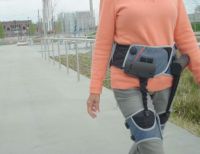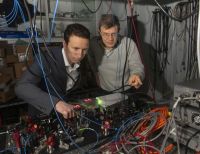A year ago, the Gazette spoke with Harvard John A. Paulson School of Engineering and Applied Sciences Professor Jim Waldo about the technological side of the pandemic-forced shift to work from home. Waldo said then that the world was experiencing a real-time experiment that would stress test the internet in ways it hadn’t been previously. A year later, the Gazette caught up with Waldo, Gordon McKay Professor of the Practice of Computer Science and the Paulson School’s chief technology officer, to see how it went.
Q&A
Jim Waldo
GAZETTE: When we spoke a year ago, you described this as an experiment in real time and, in essence, a stress test for the internet. How did the internet do?
WALDO: I’ve been working with a student on exactly this question. What we realized in going through the paper is that that question doesn’t really make sense because the internet itself is not a thing. It is a set of protocols that allow more localized networks to connect to each other and work with each other. Some of them have done quite well, and some of them have done not so well. Certain internet vendors have had a tough time in trying to scale out their offerings.
Most internet providers built their service based on a use case [scenario] of delivering entertainment: Download speeds were much higher than upload speeds. But in a world of Zoom conferences, we need something that is more symmetric in download and upload — or at least upload speeds need to be a lot faster than they were when it was mostly Netflix and HBO Max. So that disparity has really come to the fore. Then there have been the usual worries about how we get to the last mile, especially in more rural communities, where the economic incentives of the providers are not very high in offering high-speed internet.
One of the interesting things about the infrastructure bill that has been proposed in Congress is it talks a lot about universal high-speed broadband access in the same way that, back in the ’30s, the recovery bills from the Great Depression talked about telephone access for everybody.
GAZETTE: When we talk about the difference between providers, where is the dividing line? Are particular parts of the country better or worse, or is the dividing line nation to nation globally?
WALDO: The dividing lines are much more urban versus rural than they are state versus state or region versus region. Some of what we saw was sort of surprising. There was a real downtick in the quality of service for places like Austin, Texas, early on in the pandemic that you would think would have really good internet service, being that it’s become sort of a tech hub. But for the most part, cities have done reasonably well, and rural areas have done reasonably badly. So this divide is really economic and population density.
It’s really straightforward. If you are running a wire, whether it be cable or fiber, it costs the same amount per mile pretty much no matter where you put it. So if you can put it someplace where you can service 100,000 people, it’s a lot more economically advantageous than if you’re going to be serving 20. This is one of the outcomes of letting the service providers decide where and at what quality they are going to be providing service.
“We have an answer for whether the infrastructure can deal with huge spikes and consistent spikes. And the answer, surprisingly, is mostly yes.”
GAZETTE: Do you feel we’re at a point in our society’s development, and in the importance of the internet to our day-to-day lives, where government should step in and either create incentives or regulate that this has to happen?
WALDO: I think we’re at a decision point. The pandemic certainly brought home to everybody just how important the internet is to day-to-day life. It’s been central to education; it’s been central to staying in contact with people; it has become the workhorse of this pandemic. I can’t even imagine what the pandemic would have been like 40 years ago, before the networks were everywhere. We would have just had to shut down.
So as a society, I think we have to decide. We decided almost a century ago that universal telephone service was something that we wanted to have. We need to make that decision about the internet now. Maybe we will decide that it’s not something that we have to have, and we can let the free market decide. But I think that would be a mistake, quite frankly, because it will disenfranchise, in an important sense, the ability of a fairly significant chunk of our society to really connect with other parts of it. The urban-rural divide is already pretty stark.
GAZETTE: Were there important questions early in the pandemic that were answered over the last year?
WALDO: We have an answer for whether the infrastructure can deal with huge spikes and consistent spikes. And the answer, surprisingly, is mostly yes. There are pockets where it was unable to, and we know where those pockets are, and we should probably decide that we want to fix those. I think another thing that we discovered is the differential between download and upload speeds isn’t important until it’s vital. Midway through the last year, I took a look at my local internet plan, and it was a fairly standard 200 down, two to three megabits up. I switched that to an 800 down 15 up and it has made a huge difference to my ability to both teach and stay in contact with my colleagues.
GAZETTE: What were you experiencing before that?
WALDO: Before that Zoom was pretty flaky at times. There would be the standard sort of freezes. My wife and I had to be careful that we weren’t both Zooming at the same time. Afterwards, it’s just not a question anymore. It just works.
GAZETTE: If everyone did that, would that stress the provider? Or are you using extra bandwidth that they just hadn’t sold for some reason?
WALDO: It’s clear to me, as I started watching the speeds from my own home, that the actual speed I was getting was very much dependent on how much internet my neighbors were using as well. So, again, we have this infrastructure that was optimized for download, which we can think of as perhaps the internet equivalent of telephone party lines in the last century. Party lines still exist in some places, but not very many because the infrastructure has gotten better. People wanted a more reliable network for voice. I think people would like a more reliable network for internet.
One of the other things that has become really clear is that while there may be multiple internet providers, there are very few internet providers at any single place. So we essentially have, at least in regions, de facto monopolies that have very little reason to increase their offerings, at least from the sense of competition.
GAZETTE: What questions have been raised by the past year, as we look at the years to come?
WALDO: Well, we spoke about the fundamental question — whether access to high-speed broadband is something that everyone should have. And symmetric networks, from the standpoint of download and upload speeds, I think, are going to be seen as much more valuable. I also think the original notion of network neutrality — the network just carries bits and doesn’t try to distinguish between whether it’s carrying video or voice or anything else — has been shown once again to have been a good decision because we have been using the internet in ways we never expected to be using it and at volumes that we never expected to be using.
The regulatory questions are much harder. Is the internet like the telephone system used to be, where it should really be a regulated monopoly because the shared infrastructure is expensive to put in and having multiple infrastructures may not be useful? But if a company is going to be a monopoly in an area, you want to have some way of regulating it for everybody’s good. Or are we going to say that the free enterprise system will really work well, in which case we need to open up things like access to telephone poles, which is surprisingly baroque and difficult, so that we can have true competition?
GAZETTE: What does that mean? So, an internet provider who wants to run cable can’t put it on telephone poles, or has to ask the phone company?
WALDO: To get something on a telephone pole, you have to coordinate with everyone else who has something on that telephone pole, which is generally four or five different companies, and it becomes nearly impossible to do that. There’s a great book by one of my colleagues at the Law School, Susan Crawford, called “Fiber.” It’s about all of the difficulties that you will have trying to get anything on a telephone pole. It’s just eye-opening how difficult it can be to do things.
GAZETTE: It seems like such a mundane thing that nobody really thinks about. But if you can’t get your wires where they have to go, you’re dead in the water.
WALDO: Everybody thinks of the tech monopolies as being companies like Facebook or Google or Amazon, but the tech monopolies I worry about are Comcast and other base providers. Yes, there are several, but they’ve each carved out a region. Maybe if you’re lucky, you have a choice between two.
GAZETTE: How about innovations? Do you see anything new and exciting on the horizon that’s developed over the last year that you may not have without this push from the pandemic?
WALDO: The innovations I’ve seen have largely been in the areas of how we teach online, pedagogical innovation. About 10 years ago, when Harvard started working with edX, there was a lot of very good discussion among the faculty about how we teach, how we distinguish between these massive online courses and what we do in person. I think that was very healthy for teaching at Harvard. But I think the innovations that have been tried while we were forced online have been just as interesting. When we get back into the classroom, which I will love to do, it’s going to be different than it was a year and a half ago, because people have tried new things. I’ve seen a huge amount of innovation in offerings that try to replicate in-person contact with online contacts. Zoom is an obvious one that everybody went to, but there are lots of casual meeting applications that allow you to go to a space that you can wander around and talk to others.
That’s an interesting software suite, though I’m not sure it’s been as successful as people thought it would be. But there’ve been a lot of attempts at getting something like that working. So we’ve thought a lot more about how casual meetings occur than we did prior to the pandemic. Also, there’s going to be a huge amount of innovation in terms of how often we need to be on campus, especially among staff. I run the IT group for the School of Engineering and, quite frankly, we discovered that other than cultural group mechanisms, we can do our work quite well completely remotely. So we will probably be going back to work two days a week at most and then doing a lot of work from home. During the pandemic we had a new hire, a very good system administrator who was based in Brooklyn. He worked for us for four months before he finally moved up here. He moved up here because he wanted to be in this area and not because the job required it.
GAZETTE: A lot has been written about this, but do you see that geographic uncoupling of work actually happening more?
WALDO: I think it’s possible, but I don’t think it’s going to be as large as people think. It’s still going to matter that you are in the same area so that on occasion, you can come into the office and meet physically together. But I think there’s going to be much less of the five days a week on campus sort of work. People will be able to work two to three days a week at home, without any loss of productivity or loss of culture within their group.
GAZETTE: Was there a particular surprise that you experienced over the last year?
WALDO: We coped much better than we had feared. We also realized how important the casual contact — that is missing — is to the culture of Harvard, the intellectual life, and the teaching. My classes went really well. What I missed were the times that I would just run into a student and we’d talk. Much of the education that we provide is through those casual contacts, and even more important, I think, is the casual contacts between the students themselves.
GAZETTE: Some students were able to experience that, at least in some form.
WALDO: To some extent, but it wasn’t the same. Students who have come back on campus say, “Yeah, it’s better than being stuck at home or being stuck in an apartment.” But it’s still not the same as wandering around campus or having a full dining hall where you run into more people than your suitemates or the people who you have consciously invited over.
The value of a Harvard education has very little to do with the classes. It has to do with the students that we select and the fact that we put them together for four years, give them some interesting things to think about, and provide enough adult supervision to keep the “Lord of the Flies” thing from happening. They educate each other. That’s the real value of a Harvard education, and that’s what we can’t really replicate online. We’ve been trying. I did a lot more group exercises in my classes that I usually do, just so the students would have contact with each other outside the classroom.
GAZETTE: When you hear people talk about going back to normal, how much “back to normal” really is possible at this point?
WALDO: I hope it doesn’t go entirely back to what used to be “normal.” At least for me, I have found some ways of teaching that I’m not going to give up. I started taping what I would usually have given as a lecture, letting the students watch that before class. This notion of a “flipped classroom” has been around for a while, but the last year forced me to do that. And quite frankly, I hope I don’t have to give another live lecture ever again. I’ll tape it; I’ll have them watch it — I know most of them are going to watch it at 1.5 or 2x speed. I’ll sound like Alvin and the Chipmunks, but that’s OK. Then we can spend the time in class actually working on problems or discussing some of the issues that I brought up. Again, it’s back to the notion that students do best when they educate each other, and I hope that’s one thing that doesn’t change.
I would also hope that we are not the only ones who decide that staff doesn’t need to be on site all the time because we have a traffic system that is designed for 20 to 30 percent fewer people than we currently have on it. If people were working from home, we might have a traffic system that actually worked for us. I’ve been going back to campus one day a week and the traffic — there are still some jams — is breathtakingly different.
GAZETTE: Well, thank you. There are interesting things going on in a more hopeful time.
WALDO: I am more hopeful. I think sifting through what we can learn from this experience to make a non-pandemic life better is going to take some serious thought. It’ll be interesting to watch what comes out. I think another thing that has happened is we’ve all become a lot more comfortable with change because we’ve had to.
Interview was lightly edited for clarity and length.















